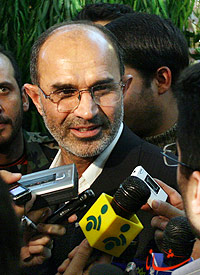The minister told reporters he had held a meeting with the Indian deputy foreign minister and other officials this week and the Indian authorities openly expressed their eagerness to take part in the peace pipeline project.
“The Indian party has a row with Pakistan on the transit fee,” recalled Nozari, adding if the issue were settled, India would surely rejoin the gas talks.
He pointed to the last round of Iran-Pakistan talks on peace pipeline and said the contract was ready and the two sides could sign the deal.
The minister, however, added, “All big contracts must be approved by the board of directors of National Iranian Oil Company (NIOC) and the special working group that follows up the oil affairs.”
He said the Pakistani party also needed to receive permits for signing the contract as the deal required the permit of NIOC’s directorate and special working group, predicting that the contract would be inked within the next two or three months.
The last round of negotiations on peace pipeline between Iranian and Pakistani delegations ended here last Tuesday.
The two sides finalized the details of the gas contract.
Iran and Pakistan discussed all articles of the contract in different expert-level sessions in Tehran and Islamabad.
The third party India has not officially announced its decision on the gas deal, but the latest remarks of Indian authorities showed their interest in resuming negotiations.
On Dec. 11, the 11th Pakistan-Iran Joint Working Group (JWG) meeting on Iran-Pakistan-India (IPI) gas pipeline project was held in Islamabad.
The two parties held an in-depth discussion on technical, financial, commercial and, legal aspects of the contract which is at the advance stage of finalization.
The Iranian delegation was led by Hojjatollah Ghanimifard, special representative of Iran’s Petroleum Ministry, whereas the Pakistani delegation was led by Farrakh Qayyum, secretary of Ministry of Petroleum and Natural Resources.
According to a joint press statement issued in Islamabad, the discussions between the two delegations on few remaining issues of the documentation were marked by positive and pragmatic approach and were held in an atmosphere of confidence and mutual understanding to achieve the goal of finalization of the contract as early as possible.
The Iranian side said the window for Indian participation to join the project might not remain open for an indefinite period on the existing terms and conditions of the project, Pakistan Times reported.
The two sides noted with satisfaction that each of them had initiated work to a certain level on the project as 40 percent of the construction of the pipeline within Iran had already been completed to provide gas to the eastern provinces of Iran and Pakistan was about to complete the work to appoint a consultant firm which would initiate the feasibility study of the project within Pakistan territory by the first quarter of the next year.
Besides having substantial delegation level discussions on Gas Sales Purchase Agreement (GSPA) and Intergovernmental Framework Agreement (IGFA), the Iranian delegation called on Ahsanullah Khan, minister of petroleum and natural resources, who conveyed the firm support of the government of Pakistan to Iran-Pakistan-India (IPI) gas pipeline project, and urged the two delegations to conclude their discussions on a mutually acceptable terms for the GSPA and IGFA.
The minister reiterated the commitment of the government of Pakistan on the IPI project in view of its strategic importance due to the emerging economic needs of the country and the depleting indigenous gas reserves.


Your Comment